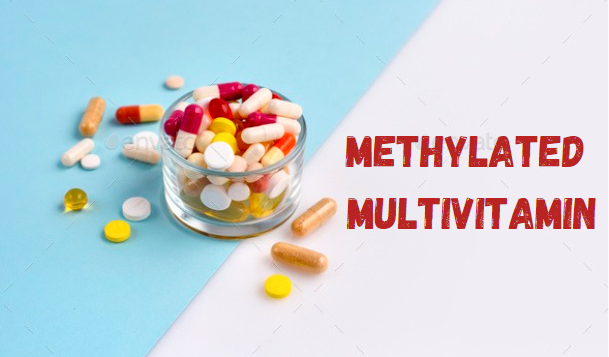Introduction
In the ever-evolving landscape of nutritional supplements, one category has gained significant attention for its superior bioavailability and effectiveness: methylated multivitamins. These advanced formulations are designed to offer the body more readily usable forms of essential vitamins, particularly beneficial for individuals with certain genetic variations or methylation issues.
This article delves into the science, benefits, and unique considerations of methylated multivitamins, providing insights and analyses beyond what’s commonly available online.
What Are Methylated Multivitamins?
Definition and Importance
Methylated multivitamins are dietary supplements that contain methylated forms of vitamins, such as methylfolate (instead of folic acid) and methylcobalamin (instead of cyanocobalamin). The methylation process involves adding a methyl group (one carbon atom and three hydrogen atoms) to these vitamins, which enhances their absorption and utilization by the body.
Key Components
- Methylfolate: The active form of folic acid that bypasses common genetic variations like MTHFR mutations, making it more accessible to the body.
- Methylcobalamin: The active form of vitamin B12, crucial for nerve function and DNA synthesis, which is more efficiently utilized than its synthetic counterpart, cyanocobalamin.
The Science Behind Methylation
Understanding Methylation
Methylation is a biochemical process essential for DNA synthesis, repair, and the regulation of gene expression. It involves the transfer of methyl groups to DNA, proteins, and other molecules, influencing a wide array of bodily functions.
Genetic Variations and Methylation
Certain genetic variations, such as mutations in the MTHFR gene, can impair the body’s ability to convert folic acid into its active form, leading to a host of health issues. Methylated vitamins bypass these genetic roadblocks, ensuring optimal nutrient absorption and functionality.
Benefits of Methylated Multivitamins
Enhanced Bioavailability
The primary advantage of methylated vitamins is their superior bioavailability. Because they are already in their active forms, the body can immediately use them, bypassing conversion steps required by non-methylated vitamins.
Improved Mental Health
Research indicates that methylfolate and methylcobalamin play crucial roles in mood regulation and cognitive function. They aid in the production of neurotransmitters like serotonin and dopamine, which are vital for mental health.
Cardiovascular Support
Methylated forms of vitamins B6, B12, and folate are integral in reducing homocysteine levels in the blood, a known risk factor for cardiovascular diseases.
Energy and Metabolism
Vitamin B12, particularly in its methylated form, is essential for energy production and metabolic processes. It helps convert food into energy and supports the function of red blood cells.
Who Should Take Methylated Multivitamins?
Individuals with MTHFR Mutations
People with mutations in the MTHFR gene often struggle with methylation and may benefit significantly from methylated vitamins.
Pregnant Women
Methylfolate is crucial during pregnancy for preventing neural tube defects and supporting fetal development.
Older Adults
As the body ages, its ability to convert vitamins into their active forms diminishes, making methylated multivitamins a valuable option for older adults.
Those with Nutrient Absorption Issues
Individuals with digestive disorders or conditions that impair nutrient absorption can benefit from the enhanced bioavailability of methylated vitamins.
Comparing Methylated and Non-Methylated Multivitamins
Absorption and Effectiveness
Methylated multivitamins are generally more effective due to their immediate usability by the body. Non-methylated vitamins require additional conversion steps, which can be less efficient, especially in individuals with genetic variations.
Side Effects
Non-methylated forms, particularly synthetic folic acid, can accumulate and potentially cause adverse effects in some individuals. Methylated forms are less likely to cause such issues.
How to Choose the Right Methylated Multivitamin
Quality of Ingredients
Opt for multivitamins that list methylated forms of B vitamins, such as methylfolate and methylcobalamin, on their labels.
Third-Party Testing
Ensure the product has been tested by third-party organizations for purity and potency.
Comprehensive Formulation
Look for a well-rounded formula that includes other essential vitamins and minerals in bioavailable forms.
Potential Side Effects and Considerations
Overmethylation
In rare cases, individuals may experience symptoms of overmethylation, such as anxiety or irritability. Adjusting the dosage or consulting a healthcare provider can mitigate these effects.
Interactions with Medications
Certain medications may interact with high doses of methylated vitamins. It’s important to consult with a healthcare provider before starting any new supplement regimen.
Incorporating Methylated Multivitamins into Your Routine
Dosage and Timing
Follow the recommended dosage on the product label or as advised by a healthcare professional. Taking multivitamins with meals can enhance absorption and reduce the risk of gastrointestinal discomfort.
Combining with Other Supplements
Methylated multivitamins can be safely combined with other supplements, but it’s advisable to avoid excessive overlap of certain nutrients.
FAQs
What are methylated multivitamins?
Methylated multivitamins are supplements containing vitamins in their methylated (active) forms, such as methylfolate and methylcobalamin, which are more easily absorbed by the body.
Who should take methylated multivitamins?
Individuals with MTHFR mutations, pregnant women, older adults, and those with nutrient absorption issues can benefit from methylated multivitamins.
Are there any side effects of taking methylated multivitamins?
While generally safe, some individuals may experience symptoms of overmethylation, such as anxiety or irritability. Consulting a healthcare provider can help manage these effects.
How do methylated multivitamins compare to regular multivitamins?
Methylated multivitamins offer superior bioavailability and effectiveness, particularly for individuals with genetic variations that impair vitamin conversion.
Can I take methylated multivitamins with other supplements?
Yes, but it’s important to avoid excessive overlap of certain nutrients. Consulting with a healthcare provider can help ensure safe and effective supplementation.
Conclusion
Methylated multivitamins represent a significant advancement in nutritional supplementation, offering enhanced bioavailability and effectiveness, particularly for individuals with genetic variations or absorption issues.
By providing the body with vitamins in their active forms, these supplements ensure optimal nutrient absorption and utilization, supporting overall health and well-being. Whether you’re looking to boost your mental health, support cardiovascular function, or improve energy levels, methylated multivitamins can be a valuable addition to your daily routine.





















+ There are no comments
Add yours